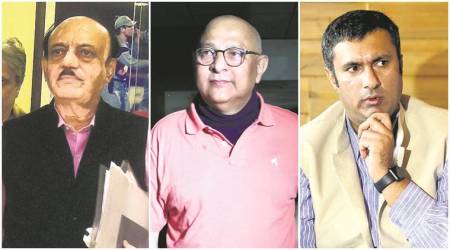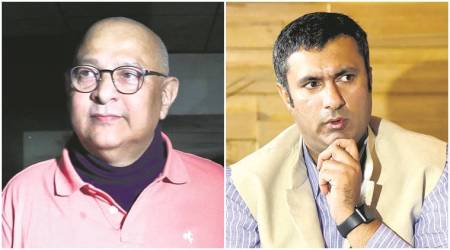 Diana Edulji, Naseeruddin Shah, Punam Raut, Harmanpreet Kaur at the Express Adda in Mumbai, Tuesday. (Source: Express Photo/Dilip Kagda)
Diana Edulji, Naseeruddin Shah, Punam Raut, Harmanpreet Kaur at the Express Adda in Mumbai, Tuesday. (Source: Express Photo/Dilip Kagda)
CALLING THE Board of Control for Cricket in India (BCCI) a “male chauvinist organisation”, former India skipper Diana Edulji, who is now a member of the Supreme Court-appointed Committee of Administrators (CoA), said the recent success of the women’s cricket team hasn’t been “accepted too well” by some BCCI members. Edulji, along with India’s World Cup stars Harmanpreet Kaur and Punam Raut, was a guest at the Express Adda event in Mumbai on Tuesday.
“I’ve always been a BCCI basher, right from the day women’s cricket came into the BCCI fold in 2006. BCCI is a very male chauvinist organisation. They never wanted women to dictate terms or get into this thing. I was very vocal right from my playing days, from when I started,” she said. “Even now, I would still say that it is not yet well accepted within BCCI that women’s cricket is doing well. It is very difficult for them (some BCCI members) to accept the fact that this team has done very well,” said Edulji.
Recalling her first meeting with former BCCI president N Srinivasan after he took over the reins in 2011, she said, “When Mr Srinivasan became president, I would like to say that I went to congratulate him at the Wankhede Stadium. He said, ‘If I had my way, I wouldn’t let women’s cricket happen’. He hates women’s cricket.”
Kaur and Raut were among the star performers during India’s remarkable World Cup campaign in England last month where they finished nine runs short of a title win. The two said they were humbled and surprised by the overwhelming reception upon their return home. While they acknowledged the meteoric rise in interest levels regarding women’s cricket in the country, Raut recalled some of the comments that she had to endure when she took up cricket seriously.
“There’s so much passion for cricket within us that we don’t ever think about getting tanned or that hum kaale ho jaayenge. There were many people in our society and some of my mother’s friends who would keep saying, ‘Isse ladki ki tarah thoda rehne ke liye sikhao. Ladki ke kaam sikhao’ .They used to ask my mother to teach me to dress up like a girl. My mother would then scold me. I would complain to my father and then they would end up arguing,” she said.
Raut added that young girls need to chase their dreams. “There are many parents who still think along those lines… You’ll get dark if you stay under the sun for six hours. Who’ll get married to you? I’ve seen today’s parents only encourage their daughters to study and say that you’ll have to get married at a fixed age and get settled. I believe if any girl likes playing, or if sport is her passion, then they should be allowed to play and be supported too,” she said.
Kaur, who after her match-winning 171 in the World Cup semi-final against Australia is being seen as the poster girl of women’s cricket in India, spoke about her days of struggle, growing up in Moga, Punjab. “When I was young I would have to beg the girls to play with me so that we could form a team of 11 players. Eventually, I would have to gather girls who were good at other sports. Cricket has become their No.1 priority now. When I started, there wasn’t a single academy in Moga. My coach started one just for me. Now, there are three exclusively for women,” said Kaur.
The three guests also responded to questions from the audience on various issues, including the possibility of having an IPL for women. While Edulji felt it was still too early for this, both Kaur and Raut said they would love for it to happen soon. “I feel like even after all that’s happened, there are a lot of changes that still need to be made for women’s cricket. I hope we don’t end up saying many years later that ‘we also used to hit sixes during our time’. So, I feel if IPL starts now, then it’s great,” said Kaur.
In the freewheeling interaction, the three guests spoke on a range of other topics — the longstanding support from the Railways for women’s cricket, their cricket battles against boys in their early days, and the possibility of appearing in television advertisements.
The Express Adda is a series of informal interactions organised by The Indian Express Group and features people who have been at the centre of change. Guests at the event in the past include the Dalai Lama, economist and Nobel laureate Amartya Sen, Union Minister Nitin Gadkari, Chief Economic Advisor Arvind Subramanian, filmmaker Karan Johar, Union Minister Piyush Goyal, writer Amitav Ghosh and cricketer Virat Kohli.

